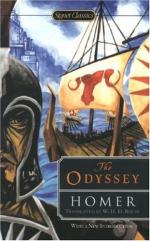“Have we any idea, Antinous, on what day Telemachus returns from Pylos? He has a ship of mine, and I want it, to cross over to Elis: I have twelve brood mares there with yearling mule foals by their side not yet broken in, and I want to bring one of them over here and break him.”
They were astounded when they heard this, for they had made sure that Telemachus had not gone to the city of Neleus. They thought he was only away somewhere on the farms, and was with the sheep, or with the swineherd; so Antinous said, “When did he go? Tell me truly, and what young men did he take with him? Were they freemen or his own bondsmen—for he might manage that too? Tell me also, did you let him have the ship of your own free will because he asked you, or did he take it without your leave?”
“I lent it him,” answered Noemon, “what else could I do when a man of his position said he was in a difficulty, and asked me to oblige him? I could not possibly refuse. As for those who went with him they were the best young men we have, and I saw Mentor go on board as captain—or some god who was exactly like him. I cannot understand it, for I saw Mentor here myself yesterday morning, and yet he was then setting out for Pylos.”
Noemon then went back to his father’s house, but Antinous and Eurymachus were very angry. They told the others to leave off playing, and to come and sit down along with themselves. When they came, Antinous son of Eupeithes spoke in anger. His heart was black with rage, and his eyes flashed fire as he said:
“Good heavens, this voyage of Telemachus is a very serious matter; we had made sure that it would come to nothing, but the young fellow has got away in spite of us, and with a picked crew too. He will be giving us trouble presently; may Jove take him before he is full grown. Find me a ship, therefore, with a crew of twenty men, and I will lie in wait for him in the straits between Ithaca and Samos; he will then rue the day that he set out to try and get news of his father.”
Thus did he speak, and the others applauded his saying; they then all of them went inside the buildings.
It was not long ere Penelope came to know what the suitors were plotting; for a man servant, Medon, overheard them from outside the outer court as they were laying their schemes within, and went to tell his mistress. As he crossed the threshold of her room Penelope said: “Medon, what have the suitors sent you here for? Is it to tell the maids to leave their master’s business and cook dinner for them? I wish they may neither woo nor dine henceforward, neither here nor anywhere else, but let this be the very last time, for the waste you all make of my son’s estate. Did not your fathers tell you when you were children, how good Ulysses had been to them—never doing anything high-handed, nor speaking harshly to anybody? Kings may say things sometimes, and they may take a fancy to one man and dislike another, but Ulysses never did an unjust thing by anybody—which shows what bad hearts you have, and that there is no such thing as gratitude left in this world.”




